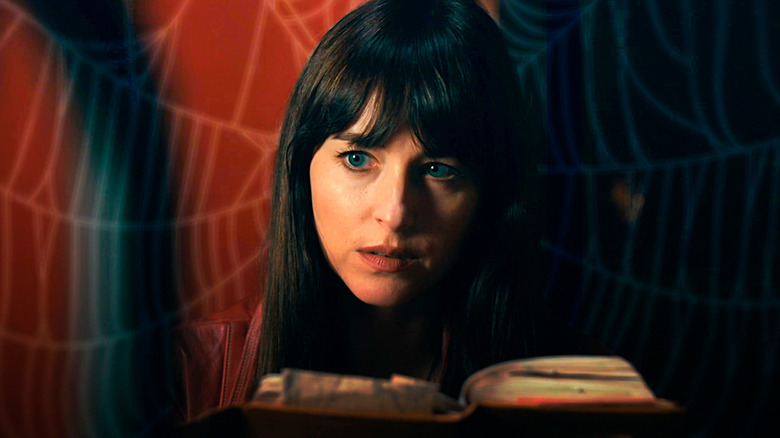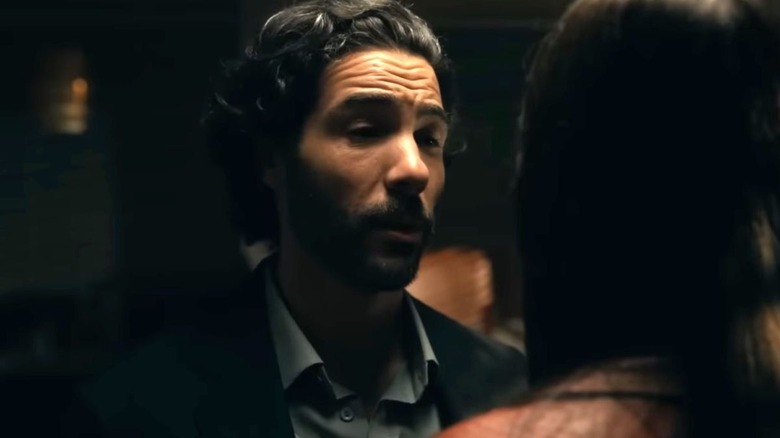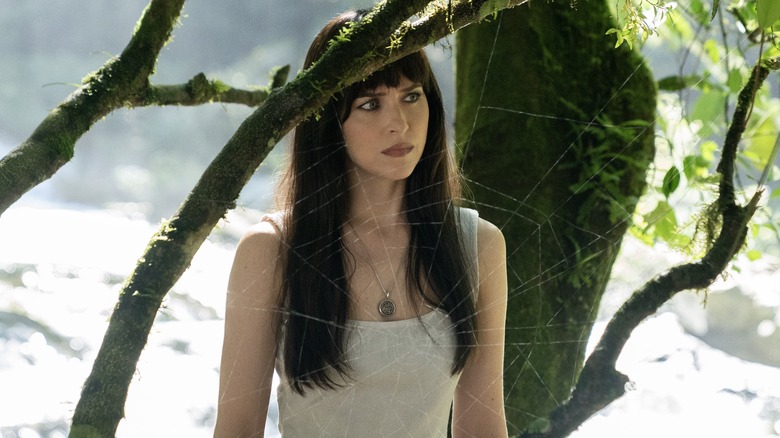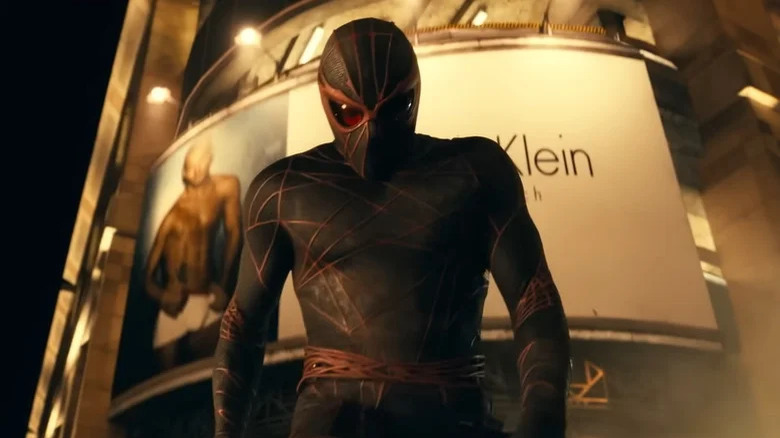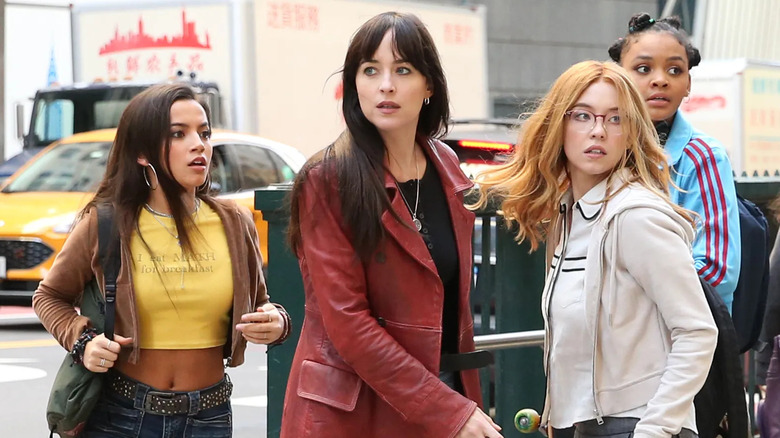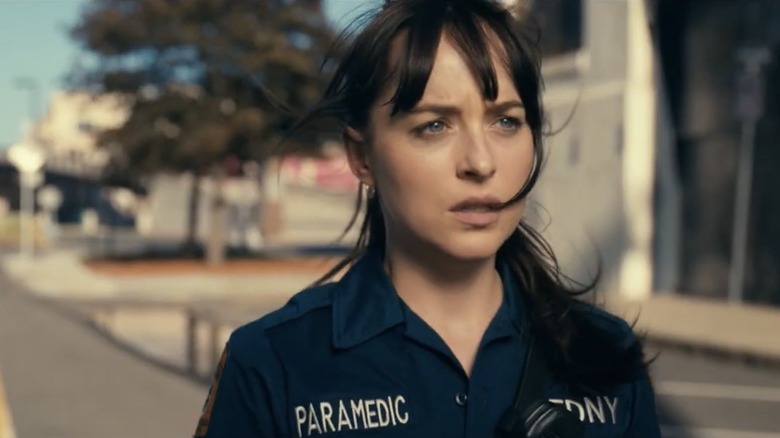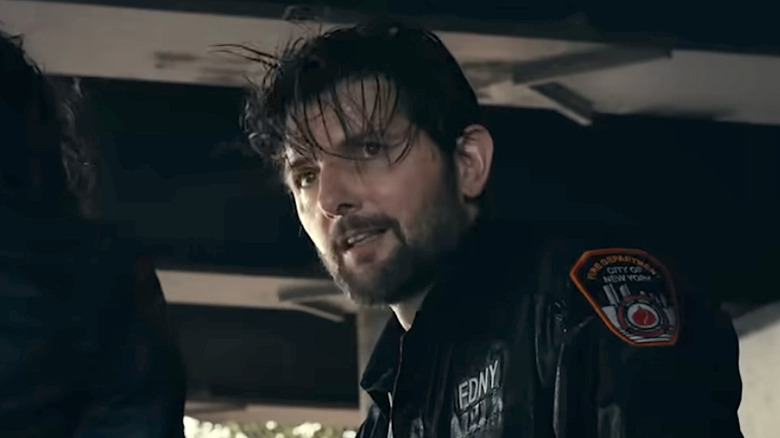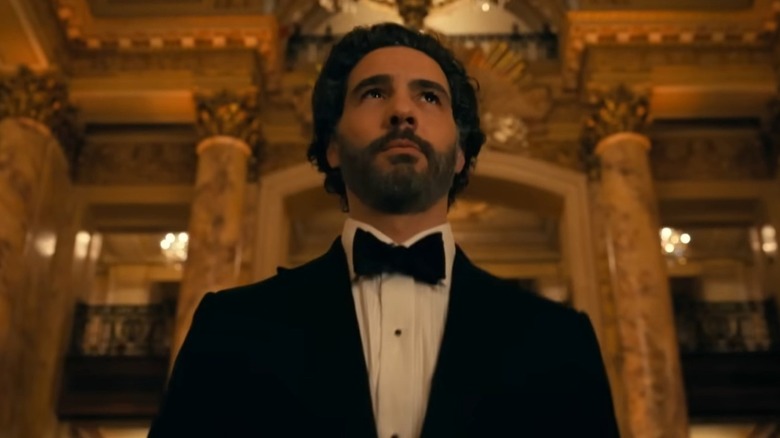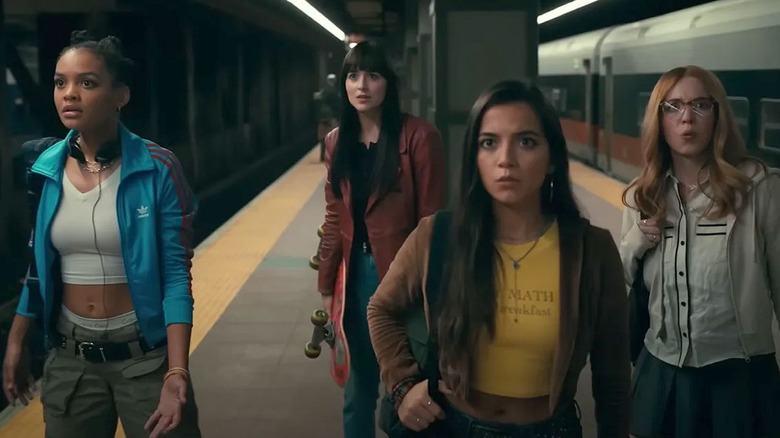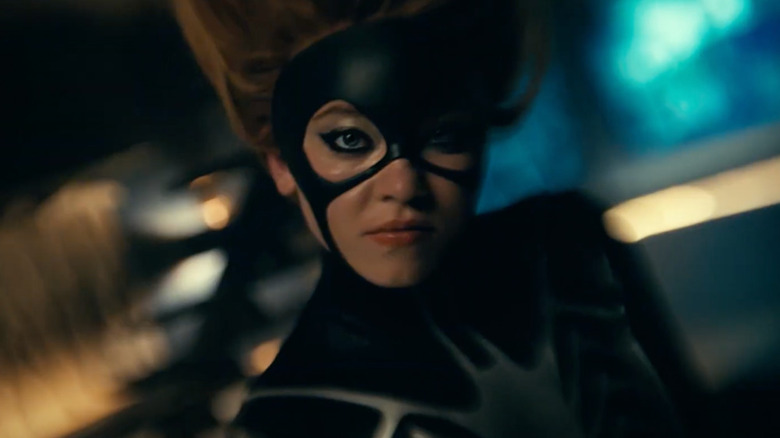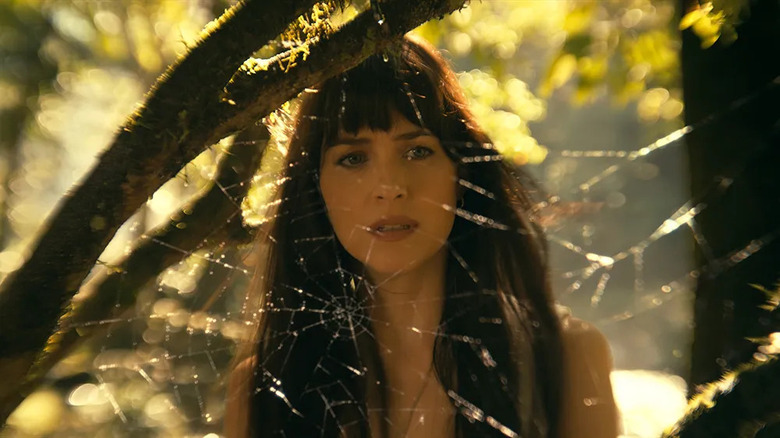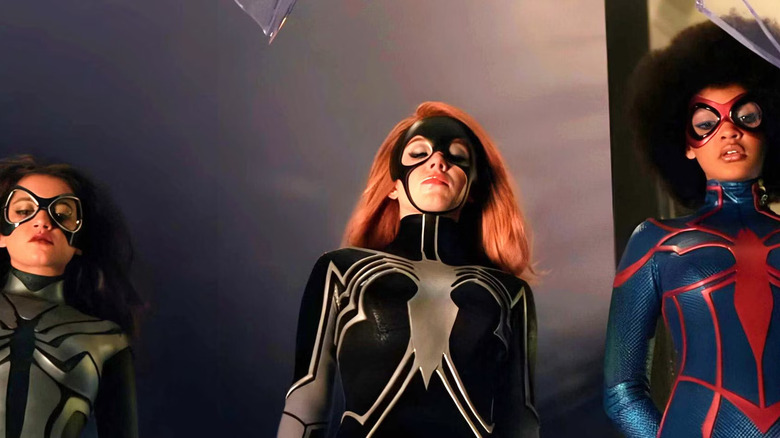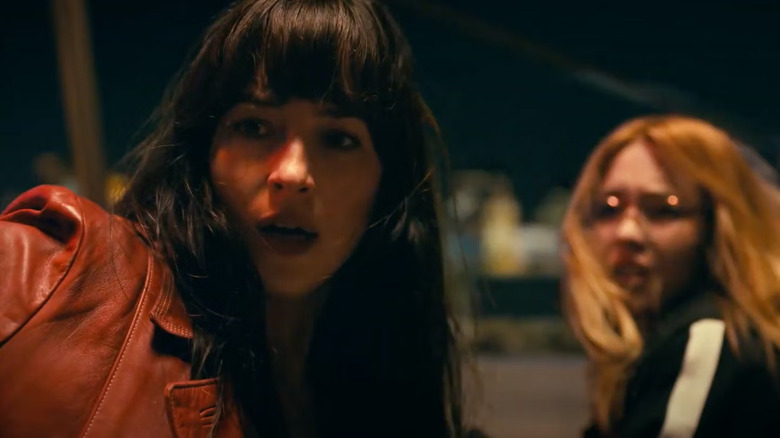Dumb Things Everyone Ignores In Madame Web
Contains spoilers for "Madame Web"
Amidst news of Marvel's "The Fantastic Four" casting and pre-production ramping up on DC's "Superman: Legacy," it might be easy for comic book fans to forget about Sony's latest addition to the comic book movie canon. "Madame Web," starring Dakota Johnson, examines the origin story of one obscure character from the Spider-Man comics of the same name. In the comics, Cassandra Webb is a clairvoyant connected to vast, interconnected web support system who appears to various Spider-People throughout the multiverse.
Sony's "Madame Web" film is their follow-up in a mixed bag of superhero movies, from Tom Hardy's "Venom" saga to 2022's critical and commercial flop "Morbius" starring Jared Leto as another obscure Spider-Man villain. As many fans expected, the film doesn't exactly live up to the standards of even the Marvel Cinematic Universe's worst film, with IGN writing, "It fails as a one-off and a franchise starter, not telling a fulfilling origin story for Cassie nor giving a compelling argument for the future Spider-Women."
Now that the movie's officially out, there may be countless examples of the film's failure to entertain audiences gathered by fans online. However, these 12 aspects of the film are the most deserving of criticism, yet some might not be the most obvious ones.
The film is chock-full of bad voice dubbing
Perhaps the most glaring issue even casual audiences will notice in "Madame Web" is the poor ADR throughout most of the movie. ADR, or automated dialogue replacement, is a routine procedure during the post-production of films in which actors are brought in to overdub lines of dialogue recorded on set in a professional studio, often to correct mistakes, service script changes, or help sound mixing on a loud location.
In the case of films like "Madame Web," poorly done ADR can be very noticeable, as actors' mouth movements will not match the words they're speaking. This is especially the case with Tahar Rahim's performance as the film's antagonist, Ezekiel Sims, who, when not shrouded in shadows that conveniently mask parts of his face, clearly did a below-average job in properly overdubbing his lines. Or perhaps the blame is on editors who haphazardly allowed those sloppy dialogue scenes to flood the finished film.
Publications like The Daily Beast tried to find an explanation for the poor voice dubbing, and critic Nick Schager claims, "Rahim is a native French speaker but that's no excuse for the awfulness of his largely ADR'd line readings, which sound as if they've been filtered through an AI voice program." However, the likeliest scenario is that the character's lines were completely rewritten in post-production, and rather than reshoot the scenes, the filmmakers opted to take the cheap, easy way out.
The movie invents Peruvian Spider-People
The very first Marvel comic featuring Spider-Man was published in 1962, and since then the character has become one of the most popular superheroes of all time. Countless comic book characters have taken on the mantle of Spider-Man, or Woman, or some other variation on the name. With volumes and volumes of Spider-Man comic history to draw from, you'd think Sony wouldn't have to bother making up lore that is not only unnecessary to tell the story of these characters, but also completely undermines the franchise they've built up.
That's basically what happens early on in "Madame Web." When a pregnant Constance (Kerry Bishé), Cassandra's mother, is attacked in the Amazon while researching spiders, she's rescued by a tribe of Peruvian Spider-People, who were foretold in legends to have gained powers from spiders that allowed them to crawl on walls and see into the future. These Spider-People are essentially responsible for helping a dying Constance give birth to Cassie.
There are a million things wrong with this plot point, the least of being that it completely throws away Peter Parker's own origin story and instead makes him guilty of cultural appropriation. The closest comic book precedent to this was the South American Spider-Clan, who appear in a 2001 comic and kidnap Peter Parker, though the obvious allusions to the Spider-Man costume in this tribe from "Madame Web" are far from the same thing.
Ezekiel Sims' motivations for stealing spiders is never explained
In comic book movies, oftentimes the antagonists are the most important piece of the puzzle, as they are the most blatant foils for the heroes and strongly and actively challenge their ideals. Sadly, the villain of "Madame Web" is perhaps one of its weakest qualities, choosing the character of Ezekiel Sims to be Cassie's foe, but he's not a very intimidating one. The character played by Tahar Rahim bears few resemblances to his comic book counterpart, as he's also a successful businessman who has gained similar powers to Spider-Man.
Audiences are introduced to Ezekiel early on, though his motivations are pretty vague. He inadvertently kills Cassie's mom while trying to steal a mutated Peruvian spider, and when he's seen later on in the future (albeit, he hasn't aged a day), he possesses a venomous touch and can crawl on walls. Ezekiel can also see the future, having constant night terrors presaging his own death by Spider-Women, causing him to hunt the trio of teenage girls down to kill them before they get their powers.
However, audiences may struggle to understand Ezekiel. He claims to have come from nothing but never elaborates. He's a rich businessman, but his actual profession is unexplained. Furthermore, in his visions of his death, he appears as an old man, so why is he in such a rush to kill off this trio of Spider-Women now?
It's set in 2003, and it wants you to remember that
Early on in "Madame Web," a title card reads "2003," indicating that the film takes place in that year. However, the film is apparently not confident in that title card, because the rest of the movie is filled with pop culture references and obvious allusions to its setting. The first of these comes during Cassandra's high-speed ambulance drive through Queens at the start of the movie, where one shot lingers on a Blockbuster video store that she passes.
Another reference to its setting happens when Cassie returns to her apartment, and a shot of its parking lot is suspiciously framed on a building wall painted with the album cover for Beyonce's "Dangerously in Love," which was released in summer 2003. Another music reference comes during one action scene set to Britney Spears' "Toxic" from her 2003 album, "In the Zone." Mid-fight, Cassie's car radio is interrupted by a DJ who blurts out, "This track is going to be huge! It's Britney Spears!"
Besides the fact that by 2003, Britney Spears had already put out two of the best-selling albums of all time, this actually complicates the "Madame Web" timeline even more. Although "In the Zone" was released in November 2003, "Toxic" wasn't sent to radio until January 2004, meaning that this radio DJ was playing a deep-cut album track that hadn't been made an official single yet. That radio DJ is just as clairvoyant as any other character in "Madame Web."
Cassandra's origin story seems complicated
It's not every day that a child is born after her pregnant mother is shot in the Amazon and rescued by Peruvian Spider-People. However, that turns out to be the origin story for Cassandra Webb. The more interesting story, though, may be how Cassie got from a mystical cave in Peru to being a paramedic in Queens, New York. Sadly, that's never examined in "Madame Web," the film immediately jump-cuts from her birth to an adult Cassandra driving an ambulance with Ben Parker (Adam Scott), of all people.
Cassie later clarifies via exposition-heavy dialogue that she grew up in the foster home system, raising further questions as to how these Peruvian Spider-People got her there. On the bright side, Cassie has an affection for her experience as a foster child, which serves no purpose but to bond her with Julia (Sydney Sweeney), Mattie (Celeste O'Connor), and Anya (Isabela Merced) later on as they all share stories of their parents' absences.
If you thought it couldn't get more confusing than all of that, you'd be wrong. Cassie later learns that, prior to her birth, Constance learned that Cassie would be a born with myasthenia gravis, the condition that paralyzed the comic book version of Madame Web. Constance nevertheless resumed her research in the Amazon despite her unborn child's illness, but it was Cassie's birth by Spider-People that apparently cured her of the disorder anyway.
The obvious foreshadowing of Peter Parker's future
The Sony Spider-Man Universe is a confusing cinematic endeavor, as the company has lent the rights to the character, played by Tom Holland, to Disney for use in the Marvel Cinematic Universe. As a result, Sony's own productions glaringly don't include Peter Parker — not even the character's Tobey Maguire or Andrew Garfield counterparts — instead pulling supporting characters and villains from the comics as their central focuses. However, "Madame Web" is the exception, as compared to "Morbius" or "Venom," it has a more direct connection to the story of Peter Parker.
In fact, "Madame Web" goes to drastic lengths to clue the audience in on the impending fate of Peter Parker. Adam Scott appears as Cassie's paramedic partner, Ben Parker, whose death will later motivate his nephew Peter's superhero adventures. Ben's heavily pregnant sister Mary (Emma Roberts), Peter's mother, also appears. When Mary is first introduced, she apologizes to Cassie after her baby kicks, not-so-subtly claiming "he keeps leaping around in there."
The entire film's final act also revolves around Mary going into labor and needing to get to the hospital. It's quite a mind-bending experience when Ezekiel, wearing a Spider-Man costume, nearly kills them. Had either Mary or Ben survived to see Peter's Spider-Man suit in the future, they'd likely have all sorts of questions for Peter.
Ezekiel's opera night hookup leads to an exposition dump
One of the worst and most frustrating scenes in "Madame Web" comes in the film's first half, when the audience is reintroduced to Ezekiel Sims in the present day of 2003. This scene begins with Sims walking into a New York opera house, sitting next to a woman (Jill Hennessy), who he's then seen taking back to his apartment and showing the spider he took from Constance all those years ago. The two then make out and are seen laying in bed together, until Sims is woken from a night vision in which he's murdered by future Spider-Woman variants of Julia, Mattie, and Anya.
As if this entire sequence doesn't already feel out-of-place and pointless, Sims' hookup then wakes up, and he proceeds to rant to her about how he continues to relive his death over and over every night, and how she could never understand what that's like. The most ridiculous part of the scene is how his hookup isn't grabbing her things and leaving almost immediately, but it gets worse. It's later revealed in the scene that this woman is an NSA employee, and this entire hookup was a ruse for Sims to kill her and steal her credentials so he can continue chasing down these Spider-Women.
Cassandra's reluctant heroism makes no sense
If "Madame Web" isn't going to flex a strong villain, the least it could do is give its protagonist an interesting character arc. Sadly, that's not on display in Sony's film, either, as Dakota Johnson's character has contradictory morals. When she's introduced in the present day, Cassandra's a paramedic in Queens, and despite some awkward interactions with patients, she seems genuinely good at her job. However, her desire to save others only goes so far.
Once Cassandra coincidentally ends up on the same train as Julia Cornwall, Mattie Franklin, and Anya Corazon and experiences a vision of the three being killed by Ezekiel Sims, she immediately leaps to action by saving the girls' lives and helping them escape Sims. However, once they all escape, Cassandra continuously acts annoyed by the girls' bickering and expresses a desire to drop them off at their parents' homes. As Paste Magazine described it, Cassie "seems well and truly uncertain about what she's doing in a sorta-superhero picture." Except ... isn't it her job to save people's lives?
Most likely, Cassandra's ambivalence towards the safety of these girls speaks to the filmmakers' desire to recreate a moral revolving around responsibility. It still feels unlikely for a professional paramedic to be so careless and cavalier when it comes to three teenage girls in danger.
Three Spider-Women and yet no comic book representation
"Madame Web" should be a triumphant moment in the history of Spider-Man movies, as it features the live-action debut of not one but three Spider-Women: Julia Carpenter, Mattie Franklin, Celeste O'Connor, and Anya Corazon. The first trailers showed glimpses of the actresses in their Spider-suits, giving some fans the hope of comic book accuracy.
Those fans' hopes were likely dashed upon seeing "Madame Web," in which these costumes only appear on screen for a few minutes of screen time at most — first at the very start of the movie and again at the very end of the film. Furthermore, by the end of the film, the trio of future Spider-Women hasn't even gotten their powers, though it's implied that Cassandra can see into the future far enough to know they will still become superheroes.
Even Cassandra's own red superhero jumpsuit, shown in promotional images for "Madame Web," doesn't make an appearance until the film's final seconds. At least comic book fans get to see Cassandra in a wheelchair with glasses at some point, as a small nod to Madame Web's frequent appearance in the comics.
Cassandra makes an impromptu visit to Peru
The final act of "Madame Web" contains a lot of moments that will make audiences scratch their heads. Among them is Cassandra's tendency to keep leaving the trio of future Spider-Women alone, even though they're being hunted by a psychotic murderer in a spider costume. Eventually, after Cassie explains the connections she has to Ezekiel Sims, she insists that she has to go to Peru to look into her mother's research, which ... does not make sense. Cassie already has journals filled with the research. What would she have to learn by going to Peru 30 years later?
As it turns out, Cassie seemingly has a lot to learn, as she bumps into the same Peruvian Spider-Person who helped her mother give birth, who takes her back to the cave where she was born. There, Cassie learns about her origin and goes on a Doctor Strange-esque LSD trip through events before she was born to learn more about her mother.
Cassie later claims, in surprise, that her mother did in fact care about her. Why was that even in question? As far as Cassie knows, she never met her mother, so who would've told her that she wasn't wanted? It's not like Cassie had no knowledge of her own identity or who her mother was.
A twist on Spider-Man's iconic philosophy
The phrase "With great power comes great responsibility" is the flagship motto of the Spider-Man character, dating back to the very first appearance of the character in 1962. It has since become a thematic through line of most "Spider-Man" stories, whether it be comics, video games, or movies. Its emotional resonance when used in these projects cannot be understated, so it makes sense that "Madame Web" would try to re-interpret it. However, like many things in this film, they do it all wrong.
During Cassandra's meeting with Santiago (José María Yazpik), the Peruvian Spider-Person, she is told, "When you take on the responsibility, great power will come." This is not the same thing as "With great power comes great responsibility." As "Madame Web" seems to imply, it's only after Cassandra accepts responsibility that she's granted power. That's the exact opposite of the original message, which is that those who are lucky enough to have power should know how to use it for good. For a line that's been so smartly interpreted in various "Spider-Man" films made by Sony, this reversal of it in "Madame Web" completely ignores the pathos behind the original proverb.
The climactic third act keeps spoiling itself
After her brief excursion to Peru, Cassie has no trouble getting back to New York City in time for Ezekiel's murder plan to continue against Julia, Mattie, and Anya. The trio of girls ends up stuck in traffic with Ben Parker and Mary on the way to the hospital to give birth to Peter Parker, as Cassie steals an ambulance to catch up with them. She's running late, however, as she starts experiencing visions of Ezekiel blowing up the car of her friends.
Desperate to stop Ezekiel, Cassie ends up driving the ambulance through a bit of Calvin Klein product placement and hitting Ezekiel in mid-air, knocking him out of the way of Ben's car. As Ben and Mary escape to the hospital, Cassie takes the three girls to a fireworks warehouse, where they hold off Ezekiel by blowing up fireworks and escape to the rooftop to meet with a rescue helicopter. As Ezekiel catches up to them, Cassie's visions guide her through saving the girls and herself, somewhat spoiling the audience on each stage of this climactic final battle.
It's obvious that "Madame Web" is a huge mess of an action movie, whether it's through nonsensical plot decisions or poor filmmaking choices. At the very least, the final battle contains the film's one cool moment: when Cassie astral-projects herself to save all three Spider-Women at once.
